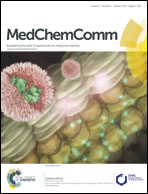The effect of a thieno[2,3-b]pyridine PLC-γ inhibitor on the proliferation, morphology, migration and cell cycle of breast cancer cells†
Abstract
3-Amino-N-(3-chlorophenyl)-5-oxo-5,6,7,8-tetrahydrothieno[2,3-b]quinoline-2-carboxamide (compound 1) is a putative phosphoinositide specific-phospholipase C-γ (PLC-γ) enzyme inhibitor. This enzyme is a plausible anticancer target linked to cell motility, important for the invasion and dissemination of tumour cells. In this work it is shown that IC50 values of compound 1 are in the low nanomolar range against a host of breast cancer cell lines as a consequence of anti-proliferative activity. These results correlate well with previously published results (Feng et al., Eur. Med. Chem., 54, 2012, 463–469) on tumour cell viability confirming the efficacy of compound 1. Flow cytometry experiments revealed that compound 1 arrests the cell cycle in the G2/M phases. Furthermore, the morphology and cell migration for the MDA-MB-231 breast cancer cell line are severely affected by administration of compound 1, which fits the hypothesis of PLC-γ inhibition. Finally, a detailed docking study against PLC reveals that the side chains of the amino acids His356, Glu341, Arg549 and Lys438 are involved in hydrogen bonding with ligand 1 as well as a lipophilic pocket is occupied by the phenyl moiety. The results presented in this study are particularly interesting because compound 1 affects triple-negative breast cancer cells, which are difficult to treat in the clinic and are in a dire need for an effective targeted therapy. We believe that compound 1 and its thieno[2,3-b]pyridine derivatives demonstrate that such a therapy can be developed.
![Graphical abstract: The effect of a thieno[2,3-b]pyridine PLC-γ inhibitor on the proliferation, morphology, migration and cell cycle of breast cancer cells](/en/Image/Get?imageInfo.ImageType=GA&imageInfo.ImageIdentifier.ManuscriptID=C3MD00290J&imageInfo.ImageIdentifier.Year=2014)

 Please wait while we load your content...
Please wait while we load your content...